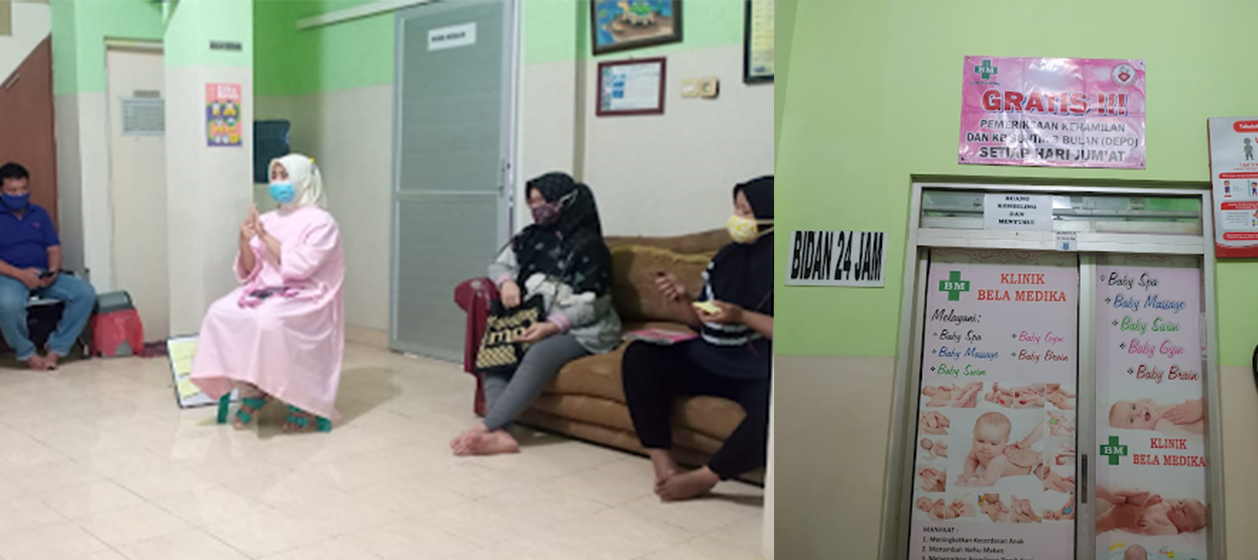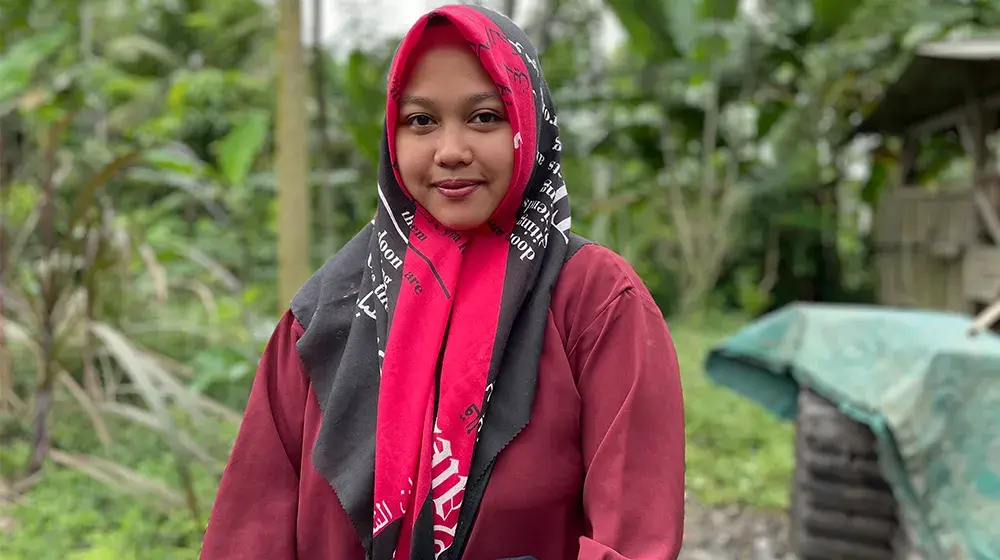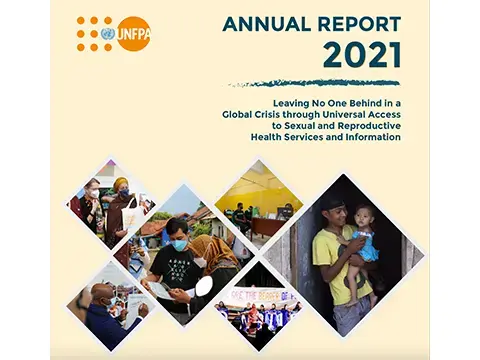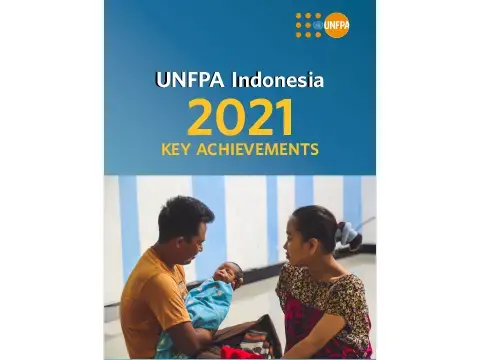“Can you imagine what would happen if we could not continue to provide family planning services? How many would have failed and resulted in unwanted pregnancies?”
The question that Emi Nurjasmi, Chairperson of the Indonesian Midwives Association (IBI) asks reflects the critical need to continue family planning and sexual and reproductive health (SRH) services during the COVID-19 pandemic. United Nations Population Fund (UNFPA) Indonesia and IBI have been working together to mitigate the impacts of the pandemic on women and other vulnerable groups, and to ensure that women’s family planning and SRH needs are continuously met.
Putting safety first
Maintaining access during a pandemic has not been easy. Midwives, as other health workers, face high risks of transmission and therefore must make sure both the safety of their patients and themselves while providing services.
“A lot of midwives have been affected. A midwife who was 28-week pregnant when she got infected died in January,” Sri Helmi of IBI South Jakarta recalls. Since the beginning of the pandemic, 472 midwives have been infected with COVID-19 in South Jakarta, five of which died, according to the Jakarta provincial board of IBI.
The situation is similar outside Jakarta. “In Tangerang district, there have been 169 midwives who tested positive for COVID-19. One died in January. In the Banten province, 1,634 midwives have been infected,” Een Setianah of IBI Tangerang explains.
Unfortunately, procuring personal protective equipment (PPE) can be challenging with rising prices and scarcity. As a result, services have been disrupted. “In March, when the pandemic started, we all panicked... Some closed their practice, while others reduced their hours,” Emi recalls. “The number of patient visits steeply declined by almost 50 percent,” Een describes.
Midwives also face challenges in following the regulation which requires them to refer pregnant women who enter the 37th-38th week of their pregnancy to the public health center (puskesmas) to prepare for safe delivery. “It’s hard to provide referrals especially for pregnant women and deliveries because not all hospitals in Tangerang accept patients whose rapid tests come out positive,” Een says.
UNFPA Indonesia has distributed PPEs consisting of hazmat suits, safety goggles, face shields, KN95 masks, medical masks, cloth masks, and disinfectants to 1,780 independent midwifery practices in Jakarta, Depok, Tangerang, Bekasi, Karawang, Serang, and Bandung, with support from Global Affairs Canada (through a joint initiative with UNICEF: the Better Sexual and Reproductive Health and Rights for All in Indonesia/BERANI) and Australia’s Department fo Foreign Affairs and Trade (DFAT). UNFPA Indonesia also supports online training for midwives in collaboration with IBI and Knowledge Hub of Reproductive Health of Universitas Indonesia’s Faculty of Public Health (FKMUI).
“Thankfully we received PPE to protect ourselves,” says Sri. “We feel more confident in providing services… Now we can continue our regular practice hours. It also helps with our expenses,” Een says.
The PPE provision has also allowed Een to offer free services at her clinic. “We found out that the reason why the number of patients has dropped drastically was mostly due to the economic situation… So we decided to provide free services every Friday from 8 AM to 4 PM,” Een describes.

(Photos: Een Setianah)
When the second wave hits, the midwives persevere
The COVID-19 pandemic took a turn for the worse in June-August 2021 in Indonesia, when the number of new infections increased dramatically and peaked at 56,757 new cases a day in mid July. Both Een and Sri were both infected, along with a number of their midwifery clinic staff. “So many people fell ill… We saw a lot of deaths among midwives in Banten,” Een recalls. “I had to close my clinic for a week, but still accepted patients who needed urgent services,” Sri explains.
Sri saw a decline in the number of patient visits during that period. “We assisted less than 10 deliveries, when usually we would have over 20,” says Sri. Now that the situation has improved, more patients have sought antenatal care (ANC) and childbirth services from Sri’s clinic. Sri discovered that due to disruptions in service provision, many pregnancies have gone unchecked for months, resulting in health issues like sternum pain among pregnant women and fetal macrosomia or newborns with excessive weight. To address them, Sri has referred the patients to obgyn specialists, whose services are covered by the Social Health Insurance (JKN).
Meanwhile, at Een’s clinic in Tangerang, the number of patients nearly doubled. “We didn’t have enough health workers, so we had to reduce our opening hours for about a week.” She still manages to provide the free maternal health and family planning services every Friday, along with her other charity activities, despite these challenges.
The work continues
Disrupting essential sexual and reproductive health services, the COVID-19 pandemic has contributed to an increase in maternal mortality rate in Indonesia, which is already one of the highest in Southeast Asia. With 305 maternal mortalities per 100,000 births, two women in Indonesia die every hour from complications during pregnancy, birth, and post-delivery (2015 Intercensal Population Survey/SUPAS 2015).
“We must collaborate with all sectors so that the burden does not only fall on health workers and midwives,” Een says firmly. Een also highlights the critical need of improving public access to knowledge through information, education and communication (IEC) programmes. “If we only improve services but access to knowledge is still limited, it won’t work.”
Sri emphasizes the urgent need for more capacity building for midwives. “We need special training to improve our skills and update our knowledge,” she says. Eventually, it will contribute to better maternal health in Indonesia. “My hope is that women can enjoy healthy pregnancy, deliver babies safely, and get help when they need it,” Sri affirms.
With all the progress achieved despite challenges, there is a reason to be optimistic about a brighter future for midwives, and women’s sexual and reproductive health. “All the support leads to strengthening of the capacity and services, and ensuring the rights of women to access reproductive health services… It’s all a circle, in which all of us must work and support each other,” Emi concludes.
Dian Agustino
Communications Analyst
UNFPA Indonesia





